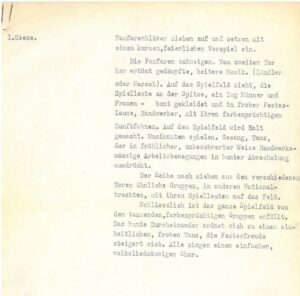As the insistence that politics should be kept out of the Olympics comes under increasingly scrutiny, Miller Archivist Clare George looks in the IMLR’s archives of German-speaking exiles, at records of an Olympics Games ninety years ago which was an expressly political act.
In July 1931 the second International Workers’ Olympiad was held in Vienna by the Sozialistische Arbeiter-Sport-Internationale (SASI) as a celebration of international solidarity rather than competition. With over 100,000 athletes from 26 countries, the event was far bigger in terms of participants than the International Olympics Committee Olympiad in Los Angeles the following year.
As with the IOC Olympics, the artistic opening ceremony to the Games in Vienna projected a cultural narrative onto the event, but unlike most such ceremonies since 1936 at least, its theme was not the host nation’s achievements and triumphs but international revolutionary struggle. Das Spiel der Viertausend (the Pageant of the Four Thousand) was created by Austrian socialist journalist and writer and later refugee, Robert Ehrenzweig, to unite participants and spectators in the story of the liberation of the proletariat against capitalist oppression.
Four thousand volunteers from the Austrian Social Democratic Party performed in the spectacle as craftsmen, farmers, soldiers, cobblers, weavers, spinners, blacksmiths, tailors, telephonists, typists and other workers. An instruction booklet published by the Party set out Ehrenzweig’s stage directions for the players, furniture and props, which included 12 tables, 24 typewriters, 4 megaphones, 40 stools and 40 distaffs. It also explained how costumes would be allocated. Outfits for craftsmen, farmers and weavers would be provided by the organisers, for example, but the 80 young socialist actors playing fascist paramilitaries would need to bring their own black shirts.
In the centrepiece of the arena a mass of scaffolding was erected decked with billboards promoting the instruments of the market system: ‘stock exchange’, ‘shares’ and ‘balances’, and topped with the cold giant face of capitalism. A Berlin newspaper reported the ‘overpowering first impression presented to the audience on entering the stadium: the vast arena, in the middle of which loomed the Tower of Capitalism, the colourful ring of the masses around the outside’.

RLU/1/2/5 Preparing the set: constructing the Tower of Capitalism (Photograph by Leo Ernst / Albert Hilscher)
Lucas had already established himself as a writer of political cabaret satirising the right wing of his Party, but his Olympics opening production was theatre on an entirely different scale. Das Spiel der Viertausend was one of the largest mass spectacles that had ever been staged. Organisers had planned two performances, during the opening and closing ceremonies – but the demand for tickets was so great that a further two performances had to be arranged hurriedly at the last minute. In all, more than 260,000 viewers saw the production over the course of the four performances. Around 20,000 of them had forged tickets, according to the Vienna police!
Three years later, with the establishment of the Austrofascist regime in 1934, Ehrenzweig left Austria for the UK, where he changed his name to Lucas and eventually found work with the BBC’s German Service. The records in this archive are a reminder of an international mass movement that was well-organised, strong and deeply rooted in working-class culture. The International Workers’ Olympics aimed to push back against the wave of nationalism that was then sweeping through Europe and beyond and provided an opportunity for athletes from different counties to compete against each other within the ideological context of international socialism and strengthening solidarity.
The papers of Robert Ehrenzweig /Lucas were kindly donated in 2015 by his sons David and John Lucas. A catalogue is available online here: https://archives.libraries.london.ac.uk/Details/archive/110050239 and the material is open for consultation in Senate House Library. A film of the 1931 Vienna International Workers’ Games can be seen here: http://mediawien-film.at/film/319/.
Dr Clare George, Miller Archivist (Research Centre for German & Austrian Exile Studies)



